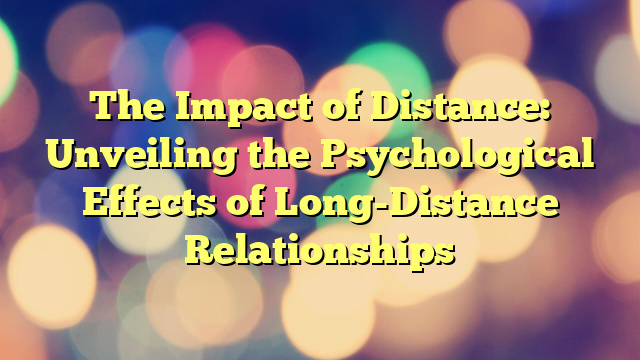The Impact of Distance: Unveiling the Psychological Effects of Long-Distance Relationships
The Impact of Distance: Unveiling the Psychological Effects of Long-Distance Relationships
Introduction
Long-distance relationships (LDRs) have become increasingly common in today’s society, with the rise of technology making it easier to connect with people from all over the world. However, despite the convenience of modern communication methods, the psychological effects of being in an LDR can be significant. In this article, we will explore the impact of distance on individuals in LDRs, including the challenges they face and the strategies they use to cope.
The Challenges of Long-Distance Relationships
One of the most significant challenges of being in an LDR is the lack of physical proximity. Couples in LDRs are often unable to see each other as frequently as they would like, which can lead to feelings of loneliness and isolation. Additionally, the lack of physical touch and intimacy can be difficult for some individuals, leading to feelings of frustration and dissatisfaction.Another challenge of LDRs is the difficulty of maintaining communication. While technology has made it easier to stay in touch, there are still limitations to virtual communication. Misunderstandings can occur more easily when communicating through text or video chat, and it can be challenging to convey emotions and tone accurately.Finally, the uncertainty of the future can be a significant source of stress for individuals in LDRs. The distance between partners can make it difficult to plan for the future, leading to feelings of anxiety and uncertainty.
Coping Strategies for Long-Distance Relationships
Despite the challenges of being in an LDR, many individuals find ways to cope and maintain their relationships. One common strategy is to establish a routine for communication. Setting aside specific times to talk or video chat can help couples feel more connected and reduce the stress of uncertainty.Another coping strategy is to find ways to stay connected despite the distance. This can include sending care packages, sharing photos and videos, or playing online games together. These activities can help couples feel more involved in each other’s lives and maintain a sense of closeness.Finally, some individuals in LDRs find it helpful to focus on personal growth and development. This can include pursuing hobbies or interests, focusing on career goals, or spending time with friends and family. By focusing on personal growth, individuals can feel more fulfilled and less dependent on their partner for happiness.
The Psychological Effects of Long-Distance Relationships
The psychological effects of being in an LDR can vary depending on the individual and the specific circumstances of the relationship. However, there are some common themes that emerge in research on LDRs.One significant psychological effect of LDRs is increased levels of anxiety and stress. The uncertainty of the future and the lack of physical proximity can lead to feelings of insecurity and worry. Additionally, the challenges of maintaining communication and dealing with misunderstandings can be a significant source of stress.Another psychological effect of LDRs is a sense of emotional distance. While technology has made it easier to stay in touch, virtual communication can feel impersonal and less satisfying than face-to-face interaction. This can lead to feelings of loneliness and isolation, even when partners are communicating regularly.Finally, some individuals in LDRs may experience a sense of detachment or disconnection from their partner. The lack of physical touch and intimacy can make it difficult to feel emotionally connected, leading to feelings of dissatisfaction and frustration.
Conclusion
In conclusion, the psychological effects of being in a long-distance relationship can be significant. Couples in LDRs face challenges such as the lack of physical proximity, difficulty maintaining communication, and uncertainty about the future. However, many individuals find ways to cope and maintain their relationships, such as establishing communication routines, finding ways to stay connected, and focusing on personal growth. By understanding the challenges and strategies of LDRs, individuals can make informed decisions about their relationships and work to maintain their emotional well-being.

